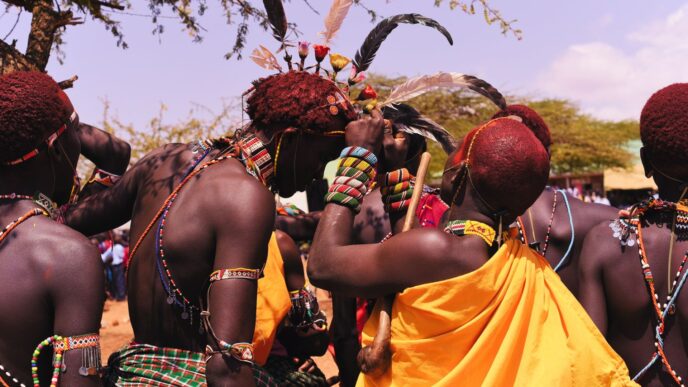African migrants living and working in the United States are earning significantly higher household incomes than the national average, with recent data highlighting their upward mobility and far-reaching impact on both the U.S. and African economies.
According to the U.S. Census Bureau’s 2024 data, migrants from several of Africa’s largest economies are out-earning the average American household, which had a median income of $80,610. The data highlights a consistent pattern of financial success among African immigrants, largely attributed to high educational qualifications, skilled professions, and entrepreneurial ambition.
The African Diaspora Network (ADN), a global organisation connecting African professionals, entrepreneurs, and academics, linked these income levels to the exceptional qualifications and industriousness of African migrants. The group noted that many Africans in the U.S. work in high-paying sectors such as healthcare, engineering, finance, and technology.
According to the CEO of ADN, Almaz Negash, the success of African migrants, particularly those from South Africa, Kenya, and Nigeria, stems from a blend of cultural values and policy structures. She explained that a deep-rooted emphasis on education, strong community networks, and selective U.S. immigration policies that prioritise skilled labour have all helped Africans excel. Negash described this group as “one of the most highly educated and professionally accomplished diasporas globally.”
Top Earning African Communities in the U.S.
Among African communities in the U.S., South Africans lead the way with a median income of $107,595—thanks to their strong presence in healthcare, tech, and academia. Kenyans follow with $93,568, reflecting their high level of education and key roles in medical and technical fields.
Cameroonians also stand out, earning $90,254, driven by careers in engineering, finance, and healthcare. Egyptians, with an average of $85,180, thrive in entrepreneurship, especially in tech and engineering, while Ghanaians earn $84,323, contributing significantly to education and healthcare.
Nigerians, known for their achievements in medicine, law, and engineering, earn $80,711—just above the U.S. national median, continuing their long-held reputation for professional excellence.
Despite these impressive earnings, African households in general—including newly arrived migrants and those in low-skilled jobs—had a lower median income of $56,490 during the reporting period. Still, this figure masks significant disparities within the broader African migrant community and does not fully capture the income of more established or highly educated groups.
The U.S. Census Bureau’s “Income in the United States: 2023” report revealed that the national median income rose by 4% from $77,540 in 2022 to $80,610 in 2023, marking the first statistically significant rise since 2019. However, the Bureau noted that income gains across racial and ethnic groups, including Black, Asian, and Hispanic households, showed no major year-on-year statistical difference.
Remittances and Global Impact

The growing financial success of African migrants in the United States is not only transforming their own lives but also making a powerful impact back home through remittances. According to the World Bank’s 2024 remittance flows report, the post-pandemic recovery in high-income job markets—especially the U.S.—has led to a surge in funds sent to low- and middle-income countries.
The Bank highlighted that employment among foreign-born workers in the U.S. had risen by 11% above pre-pandemic levels, outperforming native-born workers whose employment levels only returned to baseline. Data from the U.S. Bureau of Labour Statistics showed that foreign-born employment increased from roughly 80% during the pandemic to 110% by 2024, while native-born employment hovered around 100%.
As a result, remittances to African nations have climbed significantly. Egypt received $22.7 billion, Nigeria $19.8 billion, and Morocco $12 billion—placing them among the top recipients globally.
Negash said the economic gains made by African migrants are having a ripple effect across borders. She noted that Nigerians, in particular, have shown a strong commitment to supporting their home communities through financial contributions. Negash described the African diaspora as “a transformative force for development and innovation,” emphasising how their earnings fuel not just remittances but also broader investments.
Beyond sending money to family, many diaspora members invest in real estate, agriculture, and tech startups in their countries of origin—contributing to job creation and local economic growth. Negash explained that these financial contributions often go hand in hand with social impact, including funding scholarships, supporting healthcare, and contributing to charitable initiatives. She added that the African Diaspora Network itself receives donations ranging from $50 to $15,000 from diaspora members committed to uplifting their communities.
The World Bank also pointed to a major shift in global capital dynamics. Over the last decade, remittances have overtaken Foreign Direct Investment (FDI) in developing countries. “Remittances increased by 57 percent, while FDI declined by 41 percent,” the Bank reported, highlighting the growing influence of diaspora communities in global development.
As African migrants continue to thrive professionally and financially in the U.S., their role extends far beyond personal success. Through remittances, investments, and knowledge exchange, they are helping to reshape both American labour markets and African economies—bridging continents and deepening ties through shared progress.


 Trending
Trending 








